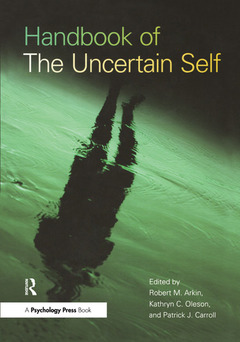Handbook of the Uncertain Self
Coordonnateurs : Arkin Robert M., Oleson Kathryn C., Carroll Patrick J.

This Handbook explores the cognitive, motivational, interpersonal, clinical, and applied aspects of personal uncertainty. It showcases both the diversity and the unity that defines contemporary perspectives on uncertainty in self within social and personality psychology. The contributions to the volume are all written by distinguished scholars in personality, social psychology, and clinical psychology united by their common focus on the causes and consequences of self-uncertainty.
Chapters explore the similarities and differences between personal uncertainty and other psychological experiences in terms of their nature and relationship with human thought, emotion, motivation, and behavior. Specific challenges posed by personal uncertainty and the coping strategies people develop in their daily life are identified. There is an assessment of the potential negative and positive repercussions of coping with the specific experience of self-uncertainty, including academic, health, and relationship outcomes. Throughout, strategies specifically designed to assist others in confronting the unique challenges posed by self-uncertainty in ways that emphasize healthy psychological functioning and growth are promoted.
In addition, the contributions to the Handbook touch on the psychological, social, and cultural context of the new millennium, including concepts such as Friedman?s "flat world," confidence, the absence of doubt in world leaders, the threat of terrorism since 9/11, the arts, doubt and religious belief, and views of doubt as the universal condition of humankind.
The Handbook is an invaluable resource for researchers, practitioners, and senior undergraduate and graduate students in social and personality psychology, clinical and counseling psychology, educational psychology, and developmental psychology.
P.J. Carroll, R.M. Arkin,K.C. Oleson, Introduction: The Uncertain Self. Part 1. Meta-Cognition and Uncertainty in Self.P. Briñol, K.G. DeMarree, R.E. Petty, Processes by which Confidence (vs. Doubt) Influence the Self. D. Eisenstadt, M.R. Leippe, Social Influences on Eyewitness Confidence: The Social Psychology of Memory Self-Certainty. B. Schwartz, Be Careful What You Wish For: The Dark Side of Freedom. G. Weary, S. J. Tobin, J.A. Edwards, The Causal Uncertainty Model Revisited. A.C.H. Szeto, R.M. Sorrentino, Uncertainty Orientation: Myths, Truths, and the Interface of Motivation and Cognition. K. Van den Bos, E.A. Lind, The Social Psychology of Fairness and the Regulation of Personal Uncertainty. C. Sedikides, D. De Cremer, C.M. Hart, L. Brebels, Procedural Fairness Responses in the Context of Self-Uncertainty. D. Wirtz, J. Kruger, D.T. Miller, P. Mathur, On First versus False Instincts. M. Johns, T. Schmader, Meta-Cognitive Regulation as a Reaction to the Uncertainty of Stereotype Threat. Part 2. Motivation and Uncertainty in Self.M.J. Landau, J. Greenberg, S. Kosloff, Coping with Life's One Certainty: A Terror Management Perspective on the Existentially Uncertain Self. C. Chang-Schneider, W.B. Swann, Jr., The Role of Uncertainty in Self-Evaluative Processes: Another Look at the Cognitive-Affective Crossfire. D.C. Marigold, I. McGregor, M.P. Zanna, Defensive Conviction as Emotion Regulation: Goal Mechanisms and Interpersonal Implications. G.J. Leornardelli, J.L. Lakin, The New Adventures of Regulatory Focus: Self-Uncertainty and the Quest for a Diagnostic Self-Evaluation. P.J. Carroll, Preparedness. Z. Chen, A.T. Law, K.D. Williams, The Uncertainty Surrounding Ostracism: Threat Amplifier or Protector? D.A. Reich, R.M. Arkin, Perceived Evaluative Styles and Self-Doubt. Part 3. Clinical and Applied Implications of the Uncertain Self.A.L. Wichman, A.D. Hermann, Deconstructing the Link between Self-Doubt and Self-Worth: Ideas to Reduce Maladaptive Coping. P. Cramer, Defense Mechanisms and Self-Doubt. M.H. Kernis, C.E. Lakey, Fragile versus Secure High Self-Esteem: Implications for Defensiveness and Insecurity. K.C. Oleson, M.T. Steckler, The Phenotypic Expressions of Self-Doubt about Ability in Academic Contexts: Strategies of Self-Handicapping and Subjective Overachievement. Part 4. General Commentaries.M.A. Hogg, Human Groups, Social Categories, and Collective Self: Social Identity and the Management of Self-Uncertainty. R. Wright, Self-Uncertainty and its Cousins. R.M. Arkin, P.J. Carroll, K.C. Oleson, Commentary: The End of the Beginning.
Bob Arkin is Professor of Psychology in the Social Psychology program at The Ohio State University. He moved to Ohio State (to become Undergraduate Dean) from the University of Missouri, Columbia where he was Assistant, Associate, and then Full Professor and held the Middlebush Chair in Psychology.
Kathryn C. Oleson is Professor and Department Head of Psychology at Reed College. She was a National Institute of Mental Health Postdoctoral Fellow at The Ohio State University from 1993 to 1995 after finishing her Ph.D. in Social Psychology at Princeton University.
Patrick J. Carroll is an Assistant Professor of Psychology at The Ohio State University-Lima. Carroll had spent the previous 3 years as a National Institute of Mental Health Postdoctoral Fellow in the Social Psychology program at The Ohio State University. Before his NIMH fellowship appointment, he received his Ph.D. (2004) and Masters (2002) degrees at the University of Florida.
Date de parution : 10-2017
17.8x25.4 cm
Date de parution : 12-2009
17.8x25.4 cm
Thème de Handbook of the Uncertain Self :
Mots-clés :
van; den; bos; uncertainty; orientation; defensive; pessimism; causal; mortality; salience; Behavioral Self-handicapping; Uncertainty Avoidance; Explicit Self-esteem; Low Implicit Self-esteem; High Explicit Self-esteem; Uncertainty Orientation; High Implicit Self-esteem; Vice Versa; Self-evaluation Motives; Causal Uncertainty; Defensive Pessimism; Terror Management Theory; Compensatory Conviction; Worldview Defense; Uncertainty Management Model; Chronic Self-doubt; Stereotype Threat; Uncertainty Salience; Uncertainty Identity Theory; Fragile High Self-esteem; Secure High Self-esteem; Mortality Salient Participants; High Entitativity Groups; Verbal Defensiveness; Personal Uncertainty



